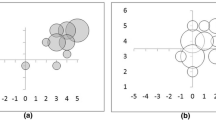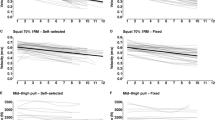Abstract
The role of beliefs based on perceived external cues in determining maximum-strength lifting performances on a resistance exercise machine was examined. The task in question was a single maximum inclined bench press performed with other strength tests once per week for 6 weeks. Forty-eight college male volunteers engaged in physical education activities unrelated to strength development were randomly assigned to three groups. All subjects lifted for 3 weeks to establish baseline strength before the resistance settings were deceptively altered for testing under the treatment conditions. In one treatment the resistance was altered so that more weight was being pressed than the subject believed. Another treatment involved lifting less weight than the subject believed, and the third treatment was performed while subjects were denied direct knowledge of weight being pressed. A control group lifted each week without any manipulation of the resistance. Treatment groups were counterbalanced for order effect. Analysis of variance of mean differences for both groups and treatments showed significant (p <.05)main effect for treatments. A posteriori comparison revealed significantly higher strength performances when the resistance was greater than the subject believed. This performance difference was attributed to subjects' attempts to remain consistent with self-expectations based upon environmental cues.
Similar content being viewed by others
References
Diggory, J. C., Klein, S. J., & Cohen, M. Muscle-action potentials and estimated probability of success.Journal of Experimental Psychology 1964,68 449–455.
Goldman, R., Jaffa, M., & Schachter, S. Yom Kippur, Air France, dormitory food, and the eating behavior of obese and normal persons.Journal of Personality and Social Psychology 1968,10 117–123.
Miller, G. A., Galanter, E. H., & Pribram, K. H.Plans and the structure of behavior. Holt, Rinehart & Winston, 1960.
Morgan, W. P., Needle, R. H., & Coyne, L. L. Psychophysiologic phenomena and muscular performance.AAHPER Research Abstracts, 1966, 71.
Nelson, L. R., & Furst, M. L. An objective study of the effects of expectation on competitive performance.Journal of Psychology 1972,81(1), 69–72.
Pribram, K. H.Languages of the brain: Experimental paradoxes and principles in neuropsychology. Englewood Cliffs, New Jersey: Prentice Hall, 1971.
Schachter, S. Obesity and eating.Science 1968,161 751–756.
Schachter, S., & Gross, L. P. Manipulated time and eating behavior.Journal of Personality and Social Psychology 1968,10 98–106.
Schachter, S., & Singer, J. Cognitive, social and physiological determinants of emotional state.Psychological Review 1962,69 379–399.
Vidacek, S., & Wishner, J. Influence of expectation of task duration on efficiency of muscular activity.Journal of Applied Psychology 1971,55(6), 564–569.
Vidacek, S., & Wishner, J. Task difficulty and the efficiency of muscular activity.Journal of Applied Psychology 1972,56 510–512.
Winer, B. J.Statistical principles in experimental design (2nd ed.). McGraw-Hill, 1971.
Author information
Authors and Affiliations
Rights and permissions
About this article
Cite this article
Ness, R.G., Patton, R.W. The effect of beliefs on maximum weight-lifting performance. Cogn Ther Res 3, 205–211 (1979). https://doi.org/10.1007/BF01172606
Issue Date:
DOI: https://doi.org/10.1007/BF01172606




